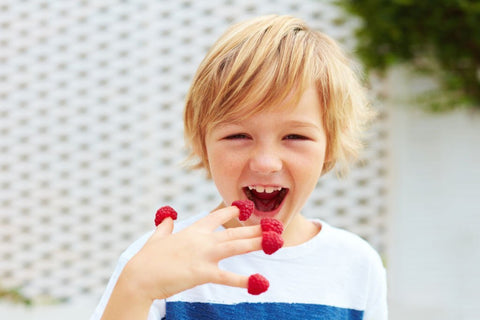Anxiety is a common problem that many kids experience. There are many different treatments available, including medication and therapy. However, did you know that vitamins can also help with anxiety? In this article, we will discuss the benefits of different vitamins for kids who suffer from anxiety. We will also provide a list of the best kid's vitamins for anxiety.
Vitamins are essential for the body to function properly. They help with cell growth, metabolism, and other important processes. Many vitamins also have mood-boosting properties that can help with anxiety.

6 Of The Best Vitamins for Anxiety
There are many different vitamins that can help with anxiety. Here is a list of the top seven vitamins for anxiety:
1) B vitamins
The B vitamins are a group of water-soluble vitamins that play an important role in cell metabolism. They are also essential for the proper functioning of the nervous system. B vitamins have been shown to help with anxiety by reducing stress and promoting relaxation.
Some good sources of B vitamins include:
- Whole grains
- Leafy green vegetables
- Meat
- Eggs
- Nuts and seeds
- Beans and legumes
- fortified foods such as cereals, bread, and nutritional yeast.
You can also take B vitamins in supplement form. However, it is always best to get your vitamins from food first. Victoria Whittington, Registered Dietitian of Camelback Nutrition and Wellness, says “I always recommend a food first approach to clients no matter what their age. Evidence shows that consuming vitamins and minerals from whole foods has a different effect on the body than from supplements.” That’s not to say that supplements can’t help fill in the gaps, but “they’re not a replacement for a poor diet.”
Vitamin B12 is the most important B vitamin for anxiety. This is because it plays a role in the production of serotonin, a neurotransmitter that helps regulate mood. B12 is found in animal products, so vegetarians and vegans may need to take supplements.
Vegetarians and vegans can get Vitamin B12 from:
- Fortified cereals
- Fortified nutritional yeast
- Fortified tofu
Vitamin B12 injections are also available. However, these should only be given under the supervision of a healthcare professional. The recommended daily intake of B12 is:
- 0.001 milligrams (mcg) for infants
- 0.002 mcg for children aged one to three years
- 0.003 mcg for children aged four to eight years
- 0.004 mcg for children aged nine to thirteen years
- 0.005-0.007 mcg for teenagers and adults
- 0.008-0.012 mcg for pregnant or breastfeeding women
The best way to get B vitamins is from food. However, you can also take supplements if necessary. Just make sure to talk to a healthcare professional before giving your child any supplements.
2) Magnesium and Calcium
Magnesium and calcium are two minerals that are essential for the proper functioning of the nervous and immune system. They have also been shown to help with anxiety by reducing stress and promoting relaxation.
The best way to get these minerals is through a well-balanced diet. If you have a picky eater who doesn’t get much variety, you may want to consider supplements. The organic forms of magnesium and calcium are the most easily absorbed by the body.
Some good sources of magnesium and calcium include:
- Dark leafy green vegetables
- Nuts and seeds
- Beans and legumes
- Fish
- Dairy products
You can also take magnesium and calcium in supplement form.
The recommended daily intake of magnesium is:
- 0.015 milligrams per pound (mg/lb) of body weight for infants
- 80 mg for children aged one to three years
- 130 mg for children aged four to eight years
- 240 mg for children aged nine to 13 years
- 350 mg for teenagers and adults
The recommended daily intake of calcium is:
- 0.015 milligrams per pound (mg/lb) of body weight for infants
- 700 mg for children aged one to three years
- 1000 mg for children aged four to eight years
- 1300 mg for children aged nine to 13 years
- 1000 mg for teenagers and adults
If you think your child may be deficient in magnesium or calcium, talk to their doctor. They can order a blood test to check levels and make recommendations on how to improve them.
3) Vitamin D (Vitamins for Anxiety)
Vitamin D is an important vitamin for overall health, but it may also be helpful in managing anxiety. Vitamin D deficiency has been linked to increased anxiety and depression symptoms.
The body can synthesize vitamin D from sunlight. You can also get it from your diet. If your child doesn’t consume much dairy or spend time in the sun, he or she may need to take a supplement. The recommended daily intake of vitamin D is:
- 0.015 milligrams per pound (mg/lb) of body weight for infants
- 600 IU for children aged one to three years
- 1000 IU for children aged four to eight years
- 1200 IU for children aged nine to 13 years
- 1500-2000 IU for teenagers and adults
A well-balanced diet with variety can beneficial in supporting growth and development, as well as helpful in managing anxiety and depression. Consuming more fruits, green leafy vegetables, whole grains, and lean protein can help improve your child’s mood and mental health.
You should also limit your child’s intake of processed foods, sugar, and caffeine. These substances can aggravate anxiety and lead to other problems like insomnia.
The good sources of Vitamin D are:
- Sunlight
- Fish liver oil
- Fatty fish like tuna, mackerel, and salmon
- Beef liver
- Cheese
- Egg yolks
All of these are great sources of Vitamin D, but the best way to get it is from sunlight. Just spending 20-30 minutes in the sun each day can help improve your anxiety symptoms.
If your child is struggling with anxiety, be sure to talk to his or her doctor. There are many treatment options available that can help. Don’t hesitate to seek help if your child is struggling.
4) Omega-3s and Omega-6s (Vitamins for Anxiety)
Omega-3s and Omega-6s are two types of essential fatty acids. They are called “essential” because our bodies can’t make them on their own. We have to get them from our diet.
Both omega 3 and omega 6 are important for our health. However, most people get too many omega-6s and not enough omega-3s. This imbalance can lead to inflammation, which has been linked to anxiety and depression.
To correct this imbalance, you should feed your child more foods that are rich in omega-3s. Some of the best sources of omega-3s are:
- Flaxseeds
- Chia seeds
- Hemp seeds
- Walnuts
- Cold-water fish like salmon, tuna, and mackerel
- Plant-based oils like flaxseed oil and hemp oil
You should also limit your child’s intake of omega-6. Foods that are high in omega-6 include:
- soybeans
- corn
- safflower and sunflower oils
- nuts and seeds
- meat, poultry, fish and eggs
These essential nutrients support physical and mental health. Be sure to include them in your diet if you are struggling with anxiety or depression.
5) L-Theanine and Lactium (GABA)
L-theanine and Lactium are two substances that are often taken for anxiety. L-theanine is an amino acid that is found in green tea, black tea, and certain kinds of mushrooms. It has been shown to reduce anxiety and improve mood. Lactium is a protein that is derived from milk. It has also been shown to reduce anxiety and improve mood.
Both L-theanine and lactium work by increasing levels of GABA in the brain. GABA is a neurotransmitter that helps to regulate anxiety.
These vitamins are both safe and effective for treating anxiety. However, they should not be used as a replacement for treatment from a mental health professional.
The best way to get theanine is by drinking green or black tea, or by eating mushrooms. You can also supplement with L-theanine. Lactium can be found in some supplements or foods that are high in protein.
Some good food sources of lactium are:
- Milk
- Cheese
- Yogurt
- Beef
- Salmon
- Tuna
If your child is struggling with anxiety or depression, including foods that increase GABA may help decrease these symptoms.
6) Probiotics
Increasing evidence continues to show a relationship between gut health and mental health. Probiotics are live bacteria that are found in yogurt and other fermented foods. They have numerous health benefits, including reducing depression and anxiety. Probiotics work by restoring the balance of good bacteria in the gut. This can help to reduce inflammation and promote healthy digestion.
If you want to try adding probiotics to your child’s diet to help with anxiety, look for yogurts that contain live cultures. Probiotic supplements are also available. Be sure to choose a reputable brand that contains live, active cultures in appropriate doses.
Probiotics are safe for most people. However, they can cause gas and bloating in some. If your child experiences these side effects, stop the probiotics and see a doctor.
Some of the organic probiotic rich foods are:
- Yogurt
- Sauerkraut
- Kimchi
- Miso soup
- Kefir
- Pickles
Probiotics are an important part of maintaining gut health. There is significant scientific research that supports gut health and mental health are related. That is why taking a probiotic can help decrease depression and anxiety and support mood.

Picky Eaters?
“The best way to support your child’s physical and mental well-being is to provide them with a well-rounded diet that includes a variety of different foods from different food groups,” says Whittington.
Some children are just plain picky eaters and won’t touch any of the foods listed above with a ten-foot pole. “Explore new foods with your child in different ways. Get creative and make experiencing new foods fun,” encourages Whittington. Even if you have a picky eater, don’t despair. There are still plenty of options for getting the nutrients they need.
One option is to give them a daily multivitamin. This will ensure that they’re getting all the vitamins and minerals they need. Another option is to give them a vitamin D supplement. Vitamin D is important for brain health and it can also help to reduce anxiety.
If your child is struggling with anxiety, talk to their doctor. They may recommend a specific supplement that can help.
A Happy Gut A Happy Mind
The scientific evidence is clear: gut health is essential for mental health. If your child is struggling with anxiety, make sure they’re getting plenty of probiotics. Probiotics are safe and effective for most people. They can be found in yogurt, fermented foods, and dietary supplements.
Vitamin D is another nutrient that is important for reducing anxiety. You can give your child a supplement or make sure they’re getting plenty of sun exposure.
L-theanine and lactium are two other substances that can help to reduce anxiety. L-theanine is found in green tea and lactium is found in milk and cheese. Both L-theanine and lactium increase levels of GABA in the brain.
Best Product for Anxiety
If you’re looking for a natural way to reduce anxiety, try using Kids Daily Essential by First Day. This supplement is made with all-natural ingredients that are safe for kids. This is specially formulated for children and it has been shown to effectively improve mood.
First Day’s Kids Daily Essential is a great way to support your child’s mental health. Your children will also love the taste of this supplement. Kids Daily Essential is easy to take and it comes in a convenient, travel-friendly bottle. Order Today!
References
- https://www.mdpi.com/2072-6643/11/9/2232
- https://www.camelbacknutritionwellness.com/
- https://pubmed.ncbi.nlm.nih.gov/32089804/
- https://www.mdpi.com/2039-7283/7/4/987
Leave a Reply